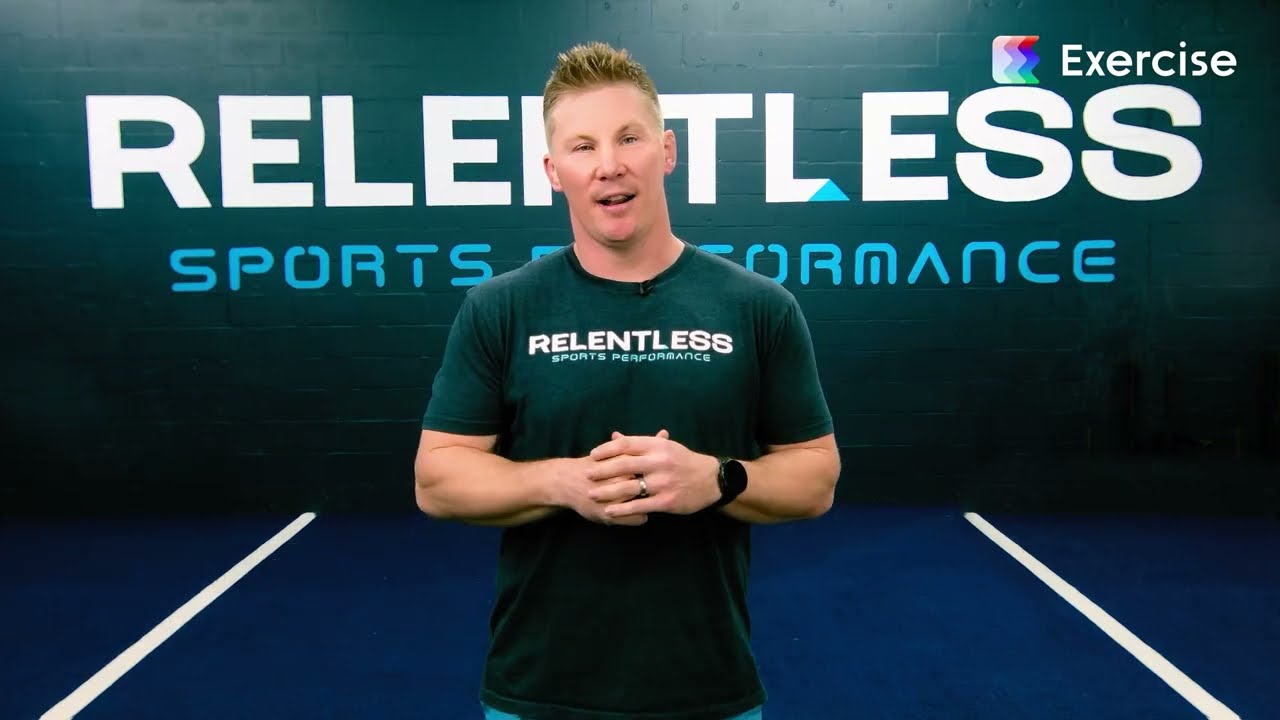100+ Best Fitness and Gym Keywords for SEO
Learn how to find the best fitness and gym keywords for SEO so that your gym or fitness business can gain organic search traffic.

Read our big list of the best gym keywords for ranking your gym website in the organic search results and getting more traffic, getting more leads for your gym, getting more gym members, and ultimately getting more gym revenue and profit. As we all know, having a strong online presence is crucial for fitness and gym businesses, and one of the most effective ways to increase visibility and attract potential customers is through local gym search engine optimization (SEO), which requires targeting the best local gym keywords that will result in highly targeted web traffic for your gym website.

And when it comes to optimizing your fitness and gym website for search engines, the selection of the right keywords is of utmost importance. In this article, we will delve into the world of fitness and gym keywords for SEO and explore their significance in driving organic traffic, enhancing user engagement, and boosting conversion rates.
Discover the most effective fitness and gym keywords for SEO to boost your website’s visibility and attract more potential clients. Be sure to also use our guide to gym lead generation so that you can create a high converting gym sales funnel or create an online fitness sales funnel (for a digital offer or in-person offer) and use the best gym website builder software so that you are adequately turning your new firehose of fitness organic web traffic into actual gym leads.
Then once they land on your gym website, use the best online booking software for gyms…
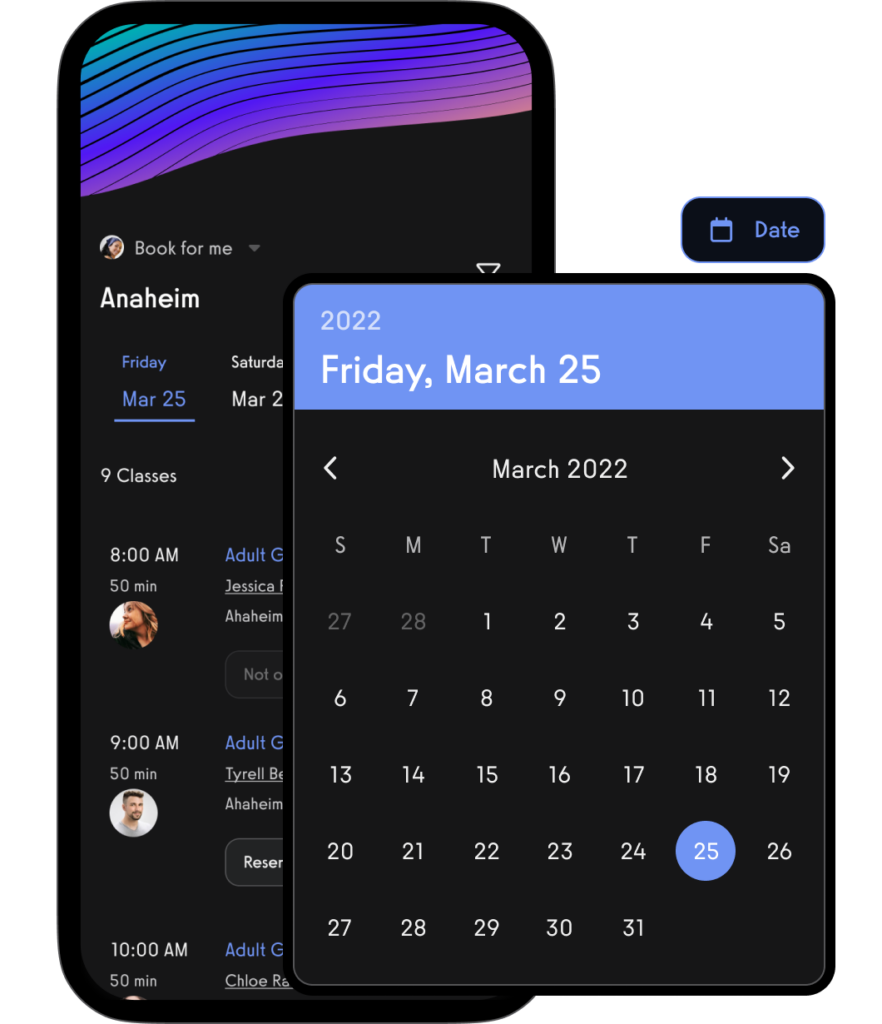
Sign them up with your custom branded gym apps…

And send marketing messages via email, SMS, and in-app messaging to progress your gym SEO leads through your gym marketing funnel.
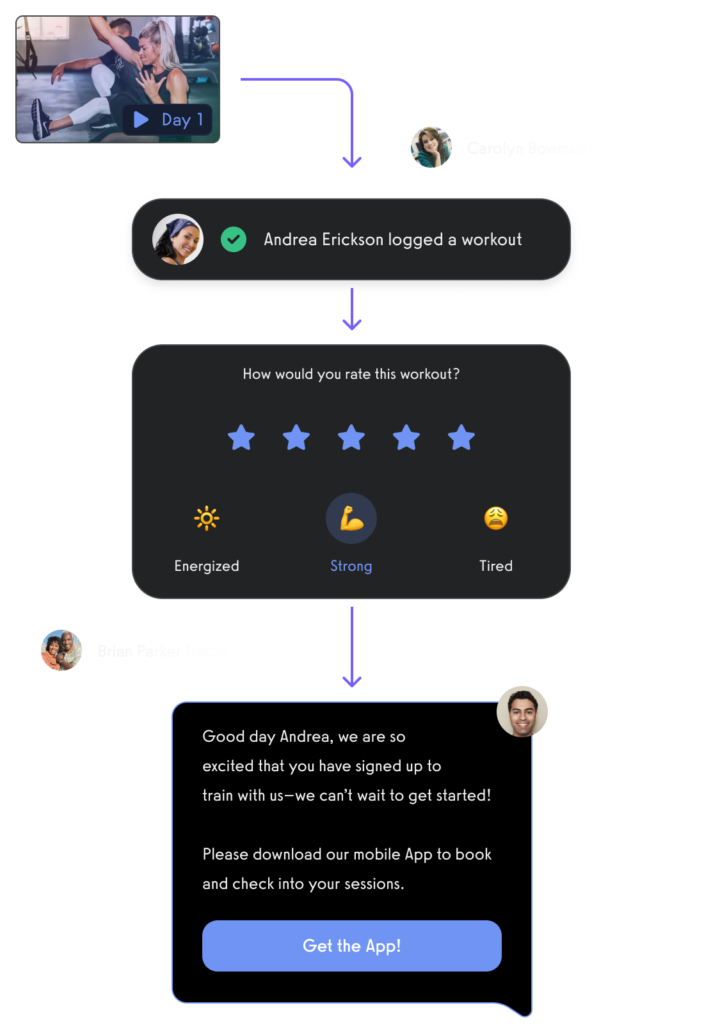
Use the best gym software, the best personal training software, and even the best fitness software for online influencers so that you can run your gym business, and grow your gym business, whether online or in-person.
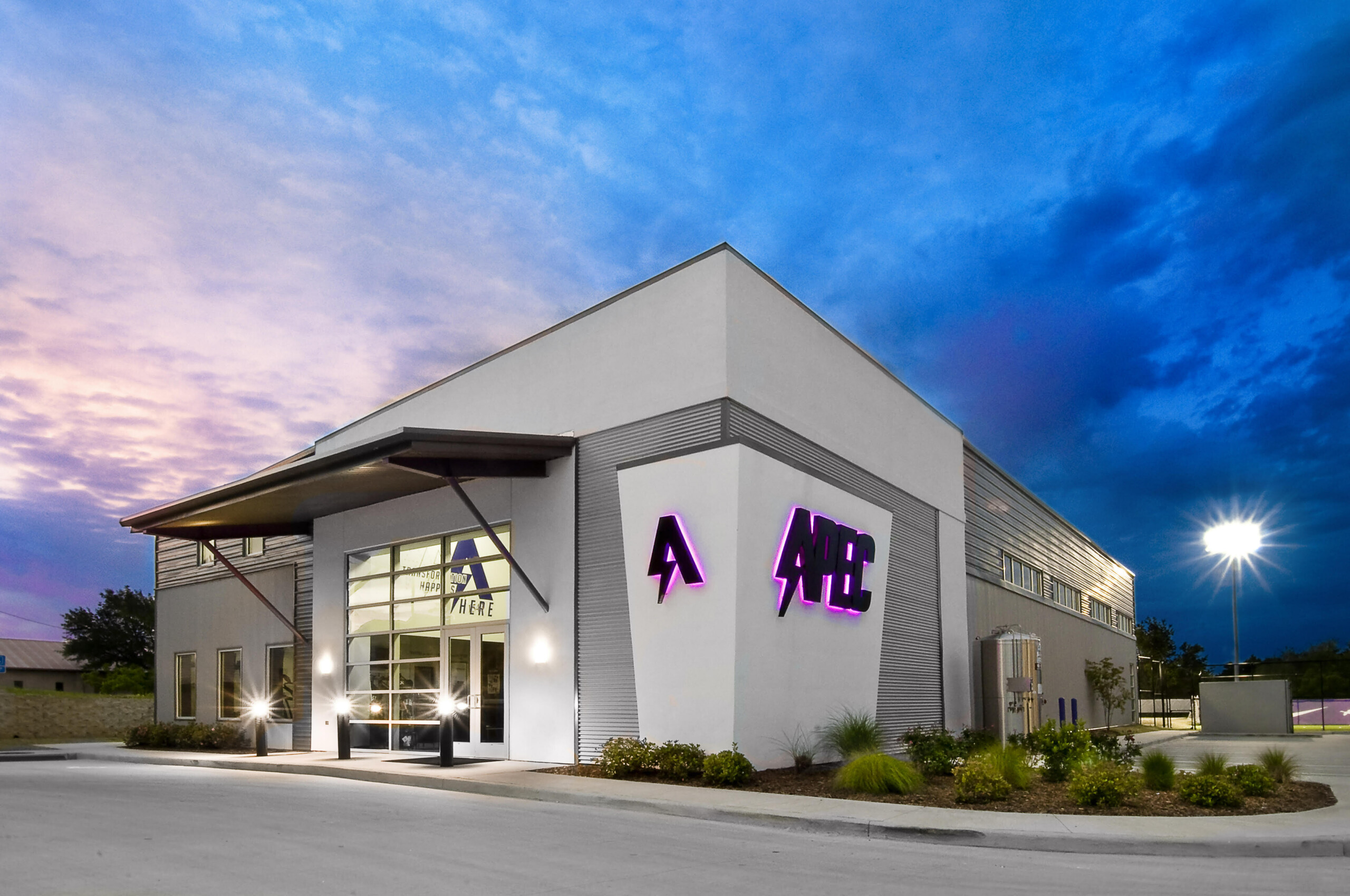
Most Searched Gym and Fitness Keywords for SEO
Crafting compelling content is crucial for gym owners and fitness professionals, but if you want to reach a broader audience and attract more customers, you need to understand what people are searching for online. SEO (Search Engine Optimization) can help enhance your visibility in search engines like Google, leading to more web traffic and potential customers. Here’s a comprehensive list of the 100 most searched gym and fitness keywords, categorized to assist you in producing more targeted content:
Gym Keywords for SEO
- Gym near me
- Gym membership cost
- 24-hour gym
- Gym equipment
- Gym classes
- Personal trainer cost
- Gym reviews
- Local gyms
- Best gym membership
- Gym deals
- Gym trials
- Childcare at gym
- Gym facilities
- Gym with sauna
- Gym with pool
- Gym cancellation policy
- Women’s gym
- Men’s gym
- Gym benefits
- Best gyms for beginners
Workout and Exercise Keywords
- Workout routines
- Exercise for weight loss
- Best exercises for abs
- Cardio workouts
- Strength training workouts
- High-intensity interval training (HIIT)
- Yoga classes
- Pilates classes
- Aerobic classes
- Zumba classes
- Workout tips for beginners
- Muscle building exercises
- Toning exercises
- Exercise for back pain
- Best exercise for flexibility
- Warm-up exercises
- Cool-down exercises
- Home workout
- Exercise without equipment
- Full body workout
Fitness and Health Keywords
- Fitness tips
- Health benefits of exercise
- Fitness motivation
- Fitness goals
- Fitness tracking apps
- Best diet for fitness
- Post-workout nutrition
- Hydration and fitness
- Fitness challenges
- Fitness tests
- Improving cardiovascular health
- Fitness for mental health
- Fitness for seniors
- Women’s fitness
- Men’s fitness
- Fitness myths
- Fitness trends
- Fitness and sleep
- Fitness recovery
- Crossfit
Gym Equipment Keywords
- Best home gym equipment
- Exercise bands
- Dumbbells
- Exercise ball
- Treadmill
- Stationary bike
- Rowing machine
- Yoga mat
- Resistance bands
- Foam roller
- Kettlebells
- Weight bench
- Pull up bars
- Weight lifting gloves
- Gym shoes
- Sports bra
- Compression leggings
- Sweatbands
- Heart rate monitors
- Fitness watches
Nutrition and Supplements Keywords
- Protein shakes
- Pre-workout supplements
- Post-workout supplements
- Weight loss supplements
- Healthy snacks for weight loss
- Meal planning for fitness
- Vegan fitness nutrition
- Hydration for exercise
- Dietary supplements for fitness
- Vitamins for fitness
- Foods for muscle recovery
- Healthy breakfast for weight loss
- High protein foods
- Low carb diet
- Ketogenic diet
- Intermittent fasting
- Foods for energy
- Superfoods for fitness
- Omega-3 and fitness
- Antioxidants and exercise
Fitness Keywords for SEO
Let’s expand on the best gym keywords above with some additional fitness keyword categories. Understanding these specific areas can also help gym owners and fitness professionals target niche audiences and expand their client base.
Types of Fitness Classes Keywords
- HIIT classes
- Zumba classes
- Pilates classes
- Spin classes
- Aerobics classes
- Kickboxing classes
- Barre classes
- Bootcamp classes
- Aqua fitness classes
- Senior fitness classes
- Cardio dance classes
- TRX classes
- Boxing classes
- Strength training classes
- Core conditioning classes
- Interval training classes
- Functional fitness classes
- Total body conditioning classes
- Circuit training classes
- Yoga classes
CrossFit Keywords
- CrossFit near me
- CrossFit workouts
- CrossFit for beginners
- CrossFit benefits
- CrossFit exercises
- CrossFit weight loss results
- CrossFit nutrition
- CrossFit equipment
- CrossFit vs gym
- CrossFit classes
- CrossFit training
- CrossFit open
- CrossFit games
- CrossFit box
- CrossFit WOD
- CrossFit shoes
- CrossFit athletes
- CrossFit injuries
- CrossFit membership cost
- CrossFit personal training
Yoga Keywords
- Yoga near me
- Yoga for beginners
- Yoga for flexibility
- Yoga for weight loss
- Yoga poses
- Yoga benefits
- Yoga styles
- Yoga vs pilates
- Yoga equipment
- Yoga mat
- Yoga pants
- Yoga meditation
- Yoga breathing exercises
- Yoga for back pain
- Yoga for stress
- Yoga for pregnancy
- Yoga retreats
- Yoga teacher training
- Yoga apps
- Yoga YouTube channels
Localizing Fitness Keywords for Your Gym Business:
Local SEO is crucial for any business that wants to attract customers in a specific geographic area. As a gym owner, you should focus not only on ranking for generic fitness keywords but also on localizing those keywords to reach your target gym audience in your gym target market.
Here’s how to create localized gym SEO keywords:
1. Add Your City or Area to the Keyword:
The easiest way to localize a keyword is by adding your city or neighborhood name to it. For example, if your gym is located in Los Angeles, you can change the keyword “gym near me” to “gym in Los Angeles” or “CrossFit in Beverly Hills.”
2. Include Local Landmarks or Neighborhoods:
Another way to localize your keywords is to include local landmarks or neighborhoods in your keywords. For instance, “Yoga classes near Central Park” or “Spin classes in SoHo.”
3. Utilize “Near Me” Keywords:
With the rise of mobile searches, ‘near me’ searches have become increasingly popular. Include keywords like “gym near me,” “fitness classes near me,” or “yoga studio near me” in your website’s content and meta tags.
4. Create Localized Content:
Beyond just adding location-specific terms to your keywords, it’s also important to create content that is genuinely localized. This could be blog posts about local fitness events, a page on your website dedicated to your specific location and what makes it unique, or even social media posts tagging your location.
5. Use Google My Business:
Google My Business is a free tool that helps manage your online presence across Google, including Search and Maps (learn how to list your gym on Google My Business). Fill out your profile completely, including your business name, location, and hours, and categorize your business accurately. This helps Google better understand your business and can help improve local rankings.
Read More: How to Manage Google Reviews for Your Gym
Examples of Localized Gym Keywords:
Here are some examples of how you can localize the keywords:
- “HIIT classes in Chicago”
- “Zumba classes near Golden Gate Park”
- “Pilates in Upper East Side”
- “Best spin classes in Dallas”
- “CrossFit workouts Miami”
- “Yoga for beginners in Austin”
Remember, SEO is a long-term strategy. It can take time to see your gym website climb the ranks of Google’s SERPs, but with consistent effort and quality content, you can help your local gym business stand out in local search results.
Top Gym SEO Keyword Research Tools:
Finding the right keywords is an essential part of any gym SEO strategy. Keyword research tools can help you identify the terms that your target audience is using to find services like yours. These tools offer valuable insights into search trends, competition levels, and more. Here are some of the best paid and free gym SEO keyword research tools, including the GPT-3 based AI model, ChatGPT, that can guide your SEO efforts:
| Keyword Research Tool | Paid/Free | Link |
|---|---|---|
| Google Keyword Planner | Free | Google Keyword Planner |
| SEMRush | Paid | SEMRush |
| Ahrefs | Paid | Ahrefs |
| Moz Pro | Paid | Moz Pro |
| Ubersuggest | Free/Paid | Ubersuggest |
| Keyword Tool | Free/Paid | Keyword Tool |
| KWFinder | Paid | KWFinder |
| WordStream’s Keyword Tool | Free | WordStream |
| Soovle | Free | Soovle |
| Jaaxy | Free/Paid | Jaaxy |
| ChatGPT by OpenAI | Free/Paid | ChatGPT |
Each tool has its unique features and data points, so it might be beneficial to use a combination of them to get a comprehensive view of your keyword landscape. Always remember to choose the keywords that align with your gym business and resonate with your target audience to optimize your SEO strategy effectively.
Understanding the Importance of Fitness and Gym Keywords in SEO
In the realms of fitness SEO and gym SEO services, recognizing the power of a well-curated fitness keywords list is crucial. These are the specific terms or phrases, such as health and fitness keywords or gym key words, that potential clients use when searching for fitness-related information, products, or services on search engines like Google.
The effective integration of fitness SEO keywords and gym related keywords into your website content is vital. This strategy can significantly boost your website’s positioning in search engine results pages (SERPs), enhancing its visibility to prospective gym-goers or personal training clients.
Strategically incorporating top fitness keywords and keywords for gym and fitness throughout your site can markedly increase your organic traffic. Users are more inclined to engage with websites that rank higher in search results, which is where keywords for health and fitness, including specific niches like crossfit SEO or fitness keywords for YouTube, become invaluable.
However, the approach to embedding these fitness related keywords and health and fitness keywords list into your content must be thoughtful. Merely stuffing your site with irrelevant or highly competitive keywords for gym can be counterproductive. A balanced, well-researched approach in utilizing gym SEO keywords, under the guidance of a gym SEO company, is essential. This method ensures that your website not only attracts the right audience but also adheres to the best SEO for personal trainers and health and fitness SEO principles.
Certainly! To ensure all the keywords are naturally incorporated, here are additional paragraphs:
In the competitive world of online fitness marketing, understanding and applying the right health and fitness SEO techniques can make a significant difference. When it comes to enhancing your online presence, gym SEO services play a pivotal role. They specialize in identifying and implementing keywords for gym and fitness that resonate with your target audience.
Utilizing a comprehensive health and fitness keywords list, which includes specific terms like gym related keywords and fitness keywords for YouTube, can elevate your content’s relevance and searchability. These keywords should not only reflect general terms but also cater to niche markets, such as those searching for crossfit SEO or looking for the best SEO for personal trainers.
Moreover, a gym SEO company can offer expert insights into the most effective gym key words and top fitness keywords. This expertise ensures that your website doesn’t just attract traffic but engages potential clients looking for credible and professional fitness guidance. It’s about creating a synergy between your content and the needs of your audience, using fitness seo keywords to bridge the gap.
The strategic use of keywords for health and fitness, backed by professional gym seo services, can significantly boost your website’s visibility and user engagement. Whether you’re a personal trainer or a gym owner, leveraging these targeted keywords can lead to substantial growth in your online presence and client base.
Let’s ensure that all the keyword phrases are included in an additional paragraph:
When crafting an SEO strategy for your fitness business, it’s essential to include a variety of specific keyword phrases. This should encompass everything from ‘fitness keywords list’, ‘fitness SEO keywords’, and ‘gym key words’ to ‘top fitness keywords’, ensuring a comprehensive approach. Additionally, it’s important to integrate ‘health and fitness keywords list’, ‘keywords for gym and fitness’, and ‘keywords for health and fitness’ into your content for a wider reach. For those creating digital content, ‘fitness keywords for YouTube’ and ‘fitness related keywords’ are crucial for online visibility.
Moreover, for businesses focusing on personal training, ‘best seo for personal trainers’ should be a key component of your SEO plan. For gyms with a specific focus, such as CrossFit centers, incorporating ‘crossfit SEO’ can attract the right audience. It’s also beneficial to work with a ‘gym SEO company’ or utilize ‘gym seo services’ for professional guidance. These experts can provide tailored ‘gym fundraising event ideas’, ensuring you target the right ‘keywords for gym’.
In essence, utilizing these specific SEO keywords, from ‘health and fitness SEO’ to ‘gym related keywords’, is vital for enhancing your online presence. This approach will not only improve your website’s search engine ranking but also ensure you connect with the appropriate audience, whether they’re searching for a ‘charity gym’, ‘charity personal training’, or general ‘health and fitness keywords’.
How to Choose the Right Fitness and Gym Keywords for Your Website
Choosing the right fitness and gym keywords requires a comprehensive understanding of your target audience, industry trends, and the specific services or products your business offers. Here are some key steps to help you select the most suitable keywords for your website:
1. Define your target audience: Understanding who your ideal customers are will help you identify the keywords they are most likely to use when searching for fitness and gym-related information.
2. Research industry trends: Stay up-to-date with the latest trends and developments in the fitness and gym industry. This will enable you to identify emerging keywords and capitalize on new opportunities.
3. Analyze competitor keywords: Take a look at what keywords your competitors are using. This can provide valuable insights into industry-specific terms and help you identify gaps that you can leverage.
4. Use keyword research tools: Utilize online tools like Google Keyword Planner, SEMrush, or Moz Keyword Explorer to discover relevant fitness and gym keywords. These tools can provide valuable data on search volume, competition level, and related keywords, helping you make informed decisions.
Top Fitness and Gym Keywords to Boost Your SEO Rankings
Now that you understand the importance of fitness and gym keywords and how to choose them, let’s explore some top keywords that can help boost your SEO rankings:
1. “Fitness center near me”: This keyword can help attract local customers who are searching for fitness centers in their area.
2. “Gym membership”: By targeting this keyword, you can capture the attention of individuals who are looking for gym membership options.
3. “Personal trainer”: This keyword is ideal for businesses offering personal training services, as it targets individuals in need of personalized fitness guidance.
4. “Weight loss programs”: If your gym specializes in weight loss programs, targeting this keyword can drive relevant traffic to your website.
5. “Group fitness classes”: This keyword targets individuals interested in joining group fitness classes, making it ideal for gyms that offer a variety of group workouts.
6. “Fitness equipment”: If your business sells fitness equipment, targeting this keyword can attract potential customers looking to purchase exercise gear.
7. “Yoga classes”: Yoga has gained immense popularity in recent years. Targeting this keyword can help your gym attract yoga enthusiasts.
8. “CrossFit training”: CrossFit is a high-intensity fitness training method that has a dedicated following. Targeting this keyword can attract individuals interested in CrossFit workouts.
9. “Healthy meal plans”: If your gym offers nutrition services or promotes healthy eating, targeting this keyword can attract users looking for meal plan options.
10. “Fitness events”: If your gym regularly hosts fitness events or challenges, targeting this keyword can attract individuals searching for upcoming fitness activities.
Remember, using a combination of broad and specific fitness and gym keywords will help maximize your reach while effectively targeting your ideal audience.
The Role of Fitness and Gym Keywords in Driving Organic Traffic to Your Website
When it comes to driving organic traffic to your fitness and gym website, the role of keywords cannot be overstated. By optimizing your website with relevant fitness and gym keywords, you increase the chances of appearing in the search results when users search for related information.
Organic traffic refers to the visitors who come to your website through non-paid (organic) search engine results. By attracting organic traffic, you can reach a wider audience and potentially convert those visitors into paying customers.
Effective fitness and gym keywords can help you capture the attention of users who are actively searching for fitness and gym-related information, products, or services. By appearing in their search results, you increase your chances of attracting motivated users who are more likely to engage with your website, explore your offerings, and potentially convert into customers.
However, driving organic traffic requires more than just keyword optimization. It also involves creating high-quality, relevant content that is valuable to your target audience. When users find your website valuable and informative, they are more likely to spend more time on your site, engage with your content, and share it with others – all of which can contribute to improved search engine rankings and increased organic traffic.
Keyword Research Techniques for Finding Effective Fitness and Gym Keywords
Effective keyword research is a crucial step in finding fitness and gym keywords that can truly make a difference in your SEO efforts. Here are some techniques you can employ:
1. Brainstorming: Start by brainstorming a list of keywords that are directly related to your fitness and gym business. Think about the services or products you offer, as well as the different aspects associated with fitness and gym activities.
2. Long-Tail Keywords: Long-tail keywords are longer and more specific phrases that users often type when they have a clear intent. For example, instead of targeting the keyword “gym,” you could target “affordable gyms in [your city].” Long-tail keywords can help you reach a more specific audience and reduce competition for highly competitive terms.
3. Customer Surveys and Interviews: Reach out to your existing customers and conduct surveys or interviews to understand the words or phrases they use when searching for fitness and gym-related information. This first-hand insight can be invaluable for identifying commonly used keywords and phrases.
4. Analyzing Google Search Suggestions: Start typing relevant fitness and gym keywords into the Google search bar and take note of the suggestions that appear. These suggestions offer a glimpse into the search habits and commonly used terms of users. Incorporating these suggestions into your keyword strategy can help you connect with a broader audience.
5. Analyzing Search Volume and Competition: Use keyword research tools to analyze the search volume and competition level for your chosen fitness and gym keywords. Ideally, aim for keywords with a good search volume and relatively low competition to maximize your chances of ranking well.
Incorporating Long-Tail Fitness and Gym Keywords for Better SEO Results
While it’s important to include broader fitness and gym keywords in your SEO strategy, incorporating long-tail keywords can significantly enhance your SEO results. Long-tail keywords tend to have lower search volume but higher conversion rates.
For example, instead of targeting the highly competitive keyword “fitness center,” you could optimize your website for “24/7 fitness center in [your city].” Although the search volume for this long-tail keyword may be lower, the users who search for it are more likely to be actively looking for a 24/7 fitness center in their area.
By incorporating long-tail fitness and gym keywords, you can attract a more specific audience that is closer to the point of making a purchasing decision. This targeted approach can lead to higher conversion rates and more qualified leads for your fitness or gym business.
Optimizing On-Page Content with Fitness and Gym Keywords for Improved Search Visibility
Optimizing your on-page content with fitness and gym keywords is an essential aspect of SEO. By strategically using relevant keywords in your website’s content, you can improve its search visibility and attract more organic traffic.
Here are some best practices for optimizing on-page content with fitness and gym keywords:
1. Title Tags: Incorporate your target fitness and gym keywords naturally within your page’s title tag. Ensure that the title is concise, compelling, and accurately reflects the content of the page.
2. Header Tags: Use header tags (H1, H2, H3, etc.) to structure your content. Include fitness and gym keywords in the relevant header tags to help search engines understand the context and relevance of your content.
3. Meta Descriptions: Craft unique and engaging meta descriptions that include fitness and gym keywords. While meta descriptions don’t directly impact search engine rankings, they play a crucial role in encouraging users to click through to your website.
4. Body Content: Incorporate fitness and gym keywords naturally and strategically throughout your page’s body content. Ensure that the keywords are relevant to the overall context and provide value to the reader. Avoid keyword stuffing, as it can have a negative impact on your website’s search engine rankings.
5. Image Alt Text: Include fitness and gym keywords in the alt text of your website’s images. This can help improve the accessibility of your content and provide additional context to search engines.
Remember, while it’s important to optimize your on-page content with fitness and gym keywords, focus on creating high-quality, valuable content that addresses the needs and interests of your target audience. By combining keyword optimization with engaging and informative content, you can enhance your website’s search visibility and user experience.
The Impact of Fitness and Gym Keywords on User Engagement and Conversion Rates
Choosing the right fitness and gym keywords and optimizing your website accordingly can have a significant impact on user engagement and conversion rates. When users find your website through their search queries, using terms they are actively searching for, they are more likely to engage with your content and take the desired actions.
By incorporating relevant fitness and gym keywords throughout your website, you can attract users who are specifically interested in fitness and gym-related information, products, or services. This targeted approach increases the chances of users finding your website valuable and relevant to their needs, leading to higher engagement levels.
Engaged users are more likely to spend more time on your website, explore multiple pages, and interact with your content. This increased engagement signals to search engines that your website is providing valuable information, ultimately leading to improved search engine rankings.
In addition to user engagement, effective fitness and gym keywords can also impact conversion rates. When users find your website through relevant keywords and engage with your content, they become more likely to convert into paying customers or take other desired actions, such as signing up for a trial membership or submitting an inquiry form.
By optimizing your website with fitness and gym keywords that resonate with your target audience, you can create a seamless user journey that guides users from their initial search to conversion.
Analyzing Keyword Competition in the Fitness and Gym Industry for SEO Success
Understanding the level of competition surrounding fitness and gym keywords is crucial for SEO success. It’s important to analyze the keyword landscape and identify opportunities that can help you gain a competitive edge. Here are some strategies for analyzing keyword competition:
1. Competitor Analysis: Analyze the websites and SEO strategies of your competitors to identify the fitness and gym keywords they are targeting. This can help you understand the landscape and discover potential gaps or untapped opportunities.
2. Keyword Difficulty: Utilize keyword research tools to assess the difficulty level of your chosen fitness and gym keywords. Keyword difficulty typically indicates how challenging it is to rank for a particular keyword. Aim for a balance between high-value, high-competition keywords and lower-competition, long-tail keywords.
3. Local Competitors: If you operate a local fitness or gym business, focus on analyzing the competition within your geographic area. Understanding the fitness and gym keywords that your local competitors are targeting can help you tailor your SEO strategy to gain an advantage in your specific market.
4. Targeting Niche Keywords: Identify niche fitness and gym keywords that have lower competition but still attract your target audience. By targeting these niche keywords, you can increase your chances of ranking well and capturing the attention of users who are actively interested in your offerings.
Effective Strategies for Using Fitness and Gym Keywords in Meta Tags and Descriptions
Meta tags and descriptions play a significant role in SEO by providing search engines and users with a concise summary of your web pages’ content. Including fitness and gym keywords strategically in your meta tags and descriptions can improve your search visibility and attract more relevant traffic.
Here are some effective strategies for using fitness and gym keywords in your meta tags and descriptions:
1. Page Titles: Incorporate your target fitness and gym keywords naturally within your page titles to provide users and search engines with an accurate summary of your page’s content.
2. Meta Descriptions: Craft compelling meta descriptions that include relevant fitness and gym keywords. Although meta descriptions don’t directly impact search engine rankings, a well-written and keyword-rich meta description is important.
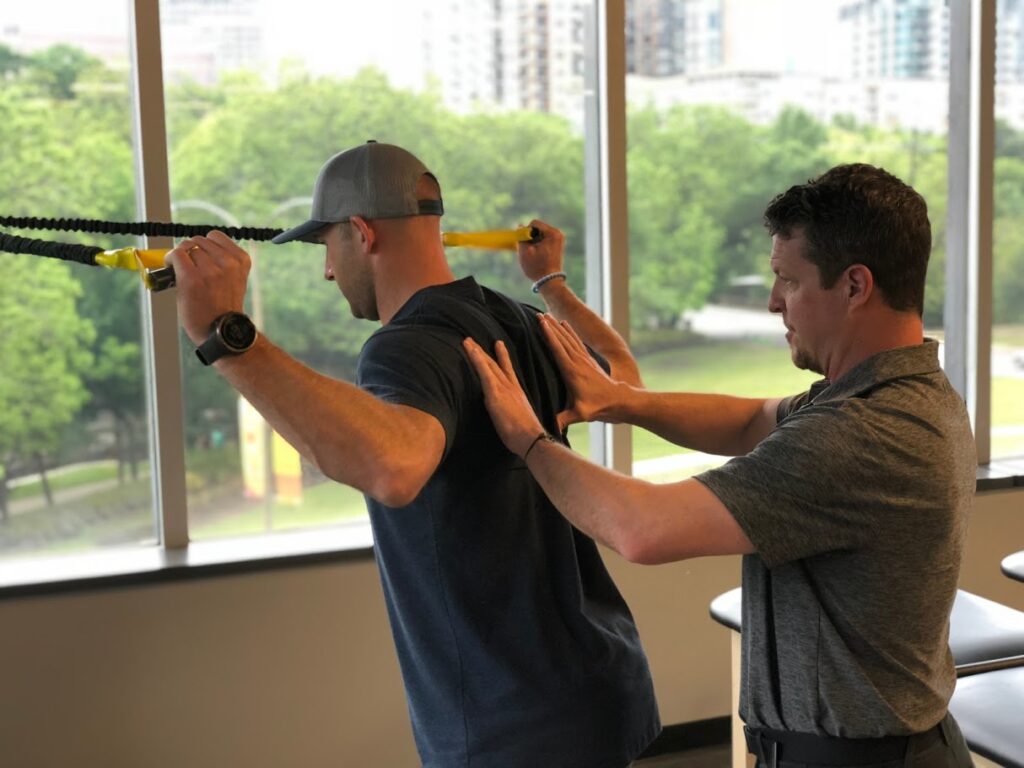
What are the best keywords for fitness classes?
The choice of keywords for fitness classes can be quite extensive and should be targeted towards the type of classes you offer and the demographics you aim to attract. These keywords can include terms such as “fitness classes,” “Yoga classes,” “HIIT classes,” “group training,” “online fitness classes,” and so forth. Consider also adding localized keywords to attract people in your specific area. For online classes, Exercise.com provides an excellent platform to host and manage your fitness classes which can also influence your keyword selection.
How do I find unique keywords for my gym website?
Finding unique keywords for your gym website requires a solid understanding of your target audience and your unique selling proposition. It involves research using tools like Google’s Keyword Planner, SEMrush, or Ahrefs to find popular search terms related to your gym’s services. Also consider long-tail keywords that are specific to your niche, location-based keywords for local SEO, and look at what keywords your competitors are targeting. Remember, your aim should be to find keywords that are relevant, have decent search volume and ideally, low competition. Exercise.com offers a comprehensive gym management software that can aid in managing and promoting your services which could in turn influence your keyword strategy.
How can I increase the rankings of my gym website?
Increasing the rankings of your gym website involves a combination of strategies. First, start with keyword optimization, using relevant keywords that your target audience is searching for. Second, ensure your website is mobile-friendly, as this is a significant factor in Google’s ranking algorithm. Third, provide high-quality, relevant content that adds value for your visitors. This could be blog posts, workout tips, nutritional advice, or updates about your gym. Fourth, work on your site’s loading speed, as faster sites are favored by search engines. Lastly, build high-quality backlinks from reputable sites. Exercise.com’s platform can help you sell online digital products, provide online booking, sell personal training packages online, and much more.
What are good keywords for a local gym?
Good keywords for a local gym might include terms that combine your location with gym-related phrases. For example, if your gym is in Seattle, you might use keywords like “Seattle gym”, “fitness classes in Seattle”, or “best gym in Seattle”. Other good local keywords might reference specific features of your gym, such as “Seattle yoga studio” or “Seattle weightlifting gym”. Exercise.com, with its custom branded fitness apps and digital landing pages, can help you convert your website visitors into purchasers.
What are the SEO tags for fitness?
SEO tags for fitness include HTML tags such as title tags, meta descriptions, and header tags (H1, H2, H3) that are optimized with relevant fitness-related keywords. These tags should accurately describe the page’s content and include keywords like ‘fitness classes,’ ‘personal training,’ ‘health and wellness,’ etc., to improve search engine ranking.
What are the keywords for fitness apparel?
Keywords for fitness apparel include ‘workout clothes,’ ‘gym wear,’ ‘athletic apparel,’ ‘sports clothing,’ ‘yoga pants,’ ‘running shorts,’ ‘fitness gear,’ and ‘activewear.’ These terms are commonly searched by consumers looking for fitness clothing.
What are the most important SEO principles for a gym?
The most important SEO principles for a gym include:
- Using Relevant Keywords: Integrate keywords related to gym services, location, and amenities.
- Quality Content: Provide informative and engaging content about fitness and gym services.
- Local SEO: Optimize for local search terms and listings to attract nearby clients.
- Mobile Optimization: Ensure the website is mobile-friendly for users on-the-go.
- Link Building: Acquire quality backlinks from reputable fitness and health websites.
How many keywords is enough for gym SEO?
For gym SEO, aim to focus on around 10-15 primary keywords that are highly relevant to your services and location. Additionally, include secondary keywords to cover various aspects of your gym, such as equipment, classes, and training programs. Quality over quantity is essential in keyword optimization.
Which gym keywords are the most popular?
Popular gym keywords include ‘gym near me,’ ‘fitness classes,’ ‘personal trainer,’ ‘weight loss programs,’ ‘health clubs,’ ‘gym membership,’ and ‘local gyms.’ These keywords often have high search volumes as they represent common queries related to gym services.
What are some different words for gym I can use for keyword research?
Different words for gym that can be used for keyword research include ‘fitness center,’ ‘health club,’ ‘athletic facility,’ ‘workout studio,’ ‘exercise room,’ ‘physical fitness center,’ and ‘training center.’
How to implement SEO for gym business?
To implement SEO for a gym business:
- Optimize Website Content: Include relevant keywords in your website’s content, titles, and meta descriptions.
- Improve Website Structure: Ensure easy navigation and a user-friendly layout.
- Engage in Local SEO: Optimize for local search by listing your gym in local directories and Google My Business.
- Create Quality Content: Regularly post blogs and articles related to fitness and health.
- Monitor SEO Performance: Use tools to track your website’s performance and make improvements as needed.
How to practice SEO and improve my gym’s organic search ranking?
To improve your gym’s organic search ranking:
- Use Relevant Keywords: Incorporate keywords naturally in your website’s content.
- Produce Regular Content: Update your blog with informative and engaging fitness-related articles.
- Optimize for Mobile: Ensure your website is mobile-friendly.
- Build Quality Backlinks: Obtain links from reputable fitness websites and local business directories.
- Utilize Social Media: Share your content on social media platforms to drive traffic.
How do I write good fitness content for my gym’s website?
To write good fitness content for your gym’s website:
- Focus on Relevant Topics: Write about subjects that interest your gym members and potential clients, like workout tips, nutrition advice, and success stories.
- Use Engaging and Clear Language: Write in an accessible and engaging tone to keep readers interested.
- Include Keywords: Integrate relevant SEO keywords naturally into your content.
- Add Visuals: Use images and videos to make the content more appealing.
- Update Regularly: Keep your website fresh with new and relevant content.
What are some of the biggest mistakes gyms make with SEO?
The biggest mistakes gyms make with SEO include:
- Ignoring Local SEO: Not optimizing for local search terms and listings.
- Keyword Stuffing: Overusing keywords, which can harm search rankings.
- Neglecting Mobile Optimization: Failing to ensure the website is mobile-friendly.
- Poor Quality Content: Publishing content that isn’t informative or engaging.
- Not Tracking SEO Performance: Failing to monitor and adjust strategies based on analytics.
How long does it take for SEO keywords to work on a gym website?
The impact of SEO keywords on a gym website can vary, but typically, noticeable improvements in search rankings can take anywhere from a few months to a year. SEO is a long-term strategy, and its effectiveness depends on various factors like competition, keyword difficulty, and the quality of the SEO efforts.
How can Exercise.com help my gym be successful online?
Exercise.com can help your gym be successful online by providing a comprehensive gymmanagement software that includes tools for marketing, member engagement, and business analytics, supporting an all-around strategy for online success in the competitive fitness industry.
